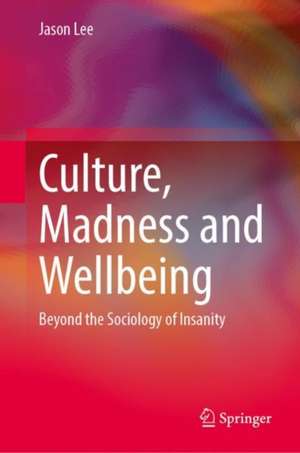Culture, Madness and Wellbeing: Beyond the Sociology of Insanity
Autor Jason Leeen Limba Engleză Hardback – 13 dec 2023
Preț: 733.33 lei
Preț vechi: 894.31 lei
-18% Nou
Puncte Express: 1100
Preț estimativ în valută:
140.32€ • 146.88$ • 116.79£
140.32€ • 146.88$ • 116.79£
Carte tipărită la comandă
Livrare economică 31 martie-14 aprilie
Preluare comenzi: 021 569.72.76
Specificații
ISBN-13: 9783031375293
ISBN-10: 3031375297
Pagini: 292
Ilustrații: XIII, 292 p. 3 illus.
Dimensiuni: 155 x 235 mm
Greutate: 0.61 kg
Ediția:1st ed. 2023
Editura: Springer International Publishing
Colecția Springer
Locul publicării:Cham, Switzerland
ISBN-10: 3031375297
Pagini: 292
Ilustrații: XIII, 292 p. 3 illus.
Dimensiuni: 155 x 235 mm
Greutate: 0.61 kg
Ediția:1st ed. 2023
Editura: Springer International Publishing
Colecția Springer
Locul publicării:Cham, Switzerland
Cuprins
Chapter 1. Introduction: Under Observation.- Chapter 2. Insanity as Truth.- Chapter 3. The Insanity of Indifference.- Chapter 4. The Invention of Insanity.- Chapter 5. Conclusions.
Notă biografică
Jason Lee (https://cjplee.com) is Professor of Film, Media, and Culture at De Montfort University, Leicester, and a Chartered Psychologist with the British Psychological Society. Lee is the author of numerous books, including Nazism and Neo-Nazism in Film and Media (Amsterdam University Press, 2018) and Sex Robots—The Future of Desire (Palgrave, 2018).
Textul de pe ultima copertă
This book is a unique study of the historical, theoretical, and cultural interpretations of ‘madness’ including interviews with those who have experiences of ‘madness’. It takes a transdisciplinary approach, employing historical, psychological, and sociological perspectives through an intersectional lens. This work explains how the prioritization of thinking over feeling in Western thought means the transrational imagination has frequently been negated in tackling mental health with detrimental results. This book, therefore, examines creative media, especially film, as a transrational form of human expression for healing and wellbeing, along with television, theatre, social media, music, and computer games. ‘Madness’ with regards to gender, sexuality, adolescence, and class in media and film is interrogated, as well as ‘madness’ and race through a focus on colonialism, post-colonialism, and psychiatry. It analyses group psychosis, including celebrity culture, and the ‘madness’ of leaders and gurus. This book challenges the lasting influence of the Age of Reason by furthering our understanding of the value of transrationality and the diverse ways of being human.
Caracteristici
Is at the nexus of the growing area of the medical humanities and social sciences Emphasizes the theoretical and global context of insanity Utilizes the latest discourse in cultural theory, and analyses film and other media
